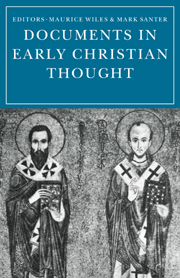1 - GOD
Published online by Cambridge University Press: 17 August 2009
Summary
The conception of God is both the most fundamental and the most difficult part of any scheme of religious thought. The Fathers were heirs to two traditions – the anthropomorphic accounts of God's loving activity in the Bible and the philosophical reflection on the changeless source of all being in Hellenistic thought. In the work of the Eastern Fathers in particular we see the interaction of these two traditions upon one another. The first four extracts chosen all come from the Eastern Church and illustrate that interaction.
Clement of Alexandria, writing towards the end of the second century, seeks to show how, on the one hand, poets and philosophers (above all Plato) and, on the other, Scripture point alike to the ineffability of God. In doing so he draws on the writings of Platonists of his own time. Origen held similar convictions, but the extensive nature of his expository and homiletic use of Scripture required him to work out their implications in more detail. The extract given here shows this concern leading him into an interesting discussion of the nature of religious language.
Basil's letter belongs to a more directly polemical context. The later Arians had claimed that it was logically impossible for the same God to be both essentially unknowable and yet known in Christian revelation. Basil meets the objection by drawing a distinction between God's essence and his attributes.
The passage from his brother Gregory of Nyssa shows the strongly religious character of this approach.
- Type
- Chapter
- Information
- Documents in Early Christian Thought , pp. 3 - 21Publisher: Cambridge University PressPrint publication year: 1975



